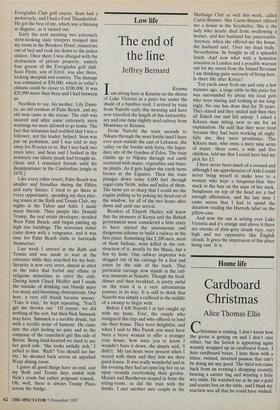Low life
The end of the line
Jeffrey Bernard
Kisumu amam sitting here in Kisumu on the shores of Lake Victoria in a patio bar under the shade of a bamboo roof. I arrived by train from Nairobi early this morning and have now travelled the length of this extraordin- ary and one-time slightly mad railway from Mombasa to Kisumu.
From Nairobi the train ascends to Nikuru through the most fertile land I have ever seen outside the east of Lebanon, the valley on the border with Syria, the legen- dary site of the Garden of Eden. The train climbs up to Nikuru through red earth scattered with maize, vegetables and bana- na plants. As it gets higher the earth turns brown at the Equator. Then the train plunges down some 4,000 feet through sugar-cane fields, miles andmiles of them. The turns are so sharp that I could see the engine pulling us by poking my head out of the window, for all of the two hours after dawn and until our arrival.
Readers of Elspeth Huxley will know that the pioneers of Kenya and the British government were considered a little crazy to have started the uneconomic and dangerous scheme to build a railway in the first place. Something like 2,300 men, most of them Indians, were killed in the con- struction of it, mostly by the Masai, but a few by lions. One railway inspector was dragged out of his carriage by a lion and eaten by the side of the track. That particular carriage now stands in the rail- way museum at Nairobi. Though the food, dinner and then breakfast, is pretty awful on the train it is a very adventurous journey in its way. It is odd to think that Nairobi was simply a railhead in the middle of a swamp to begin with.
Before I left Nairobi I at last caught up with my hosts. First, the couple who instigated this trip and who offered to lend me their house. They were delightful, and when I said to Mrs Parish you must have been a brave woman to offer a stranger your house, how were you to know I wouldn't burn it down, she simply said, 'I didn't.' My last hosts were present when I stayed with them and they lent me their guest house. It was really wonderful and in the evening they had an open log fire on an open veranda overlooking their garden. Mozart and Beethoven seeped in from the sitting-room, as did the man with the drinks. I met another nice couple in the Muthaiga Club as well this week, called Curtis-Bennet. Mrs Curtis-Bennet offered me a house in the Seychelles. She is the lady who nearly died from swallowing a hornet, and her husband has pancreatitis. Anyway, when she offered me the house, the husband said, 'Over my dead body.' Nevertheless, he bought us all a splendid lunch. And now what with a homeless situation in London and a possible warrant out for my arrest from the Inland Revenue I am thinking quite seriously of living here. Is there life after Kenya?
Ten yards away from me and only a few minutes ago, a large table in this patio bar was surrounded by about ten local girls who were staring and looking at me long- ingly. No one has done that for 20 years. They stared and they smiled and then they all flaked out and fell asleep. I asked a Kikuyu man sitting next to me for an explanation. He said that they were tired because they had been working all night. Silly me, they were prostitutes. The Kikuyu man, who owns a mere nine acres of maize, three cows, a wife and five children, told me that I could have had my pick for £3.
I have never been much of a coward and although I am apprehensive of Aids I could never bring myself to make love to a woman who kept a turquoise-blue biro stuck in the bun on the nape of her neck. Sunglasses on top of the head are a bad enough affectation, and the last time I came across that I had to spend the duration reading the Harrods label on the pillow-case.
And now the sun is setting over Lake Victoria and it's orange and above it there are streaks of slate-grey clouds very, very high and not oppressive like English clouds. It gives the impression of this place being vast. It is.










































































 Previous page
Previous page